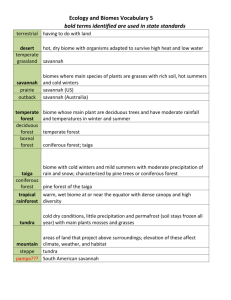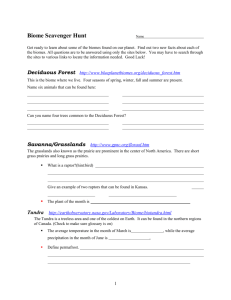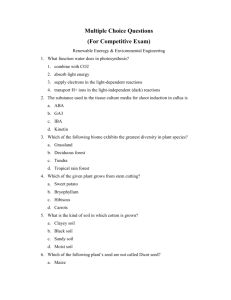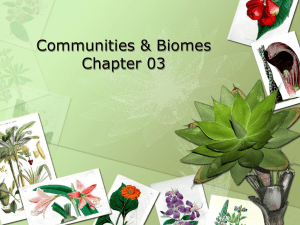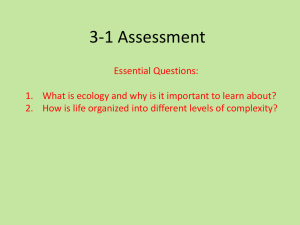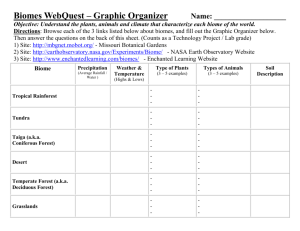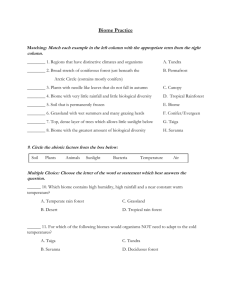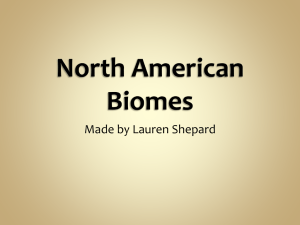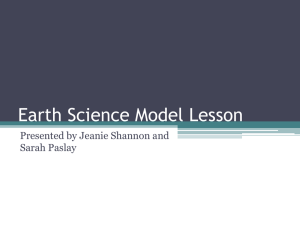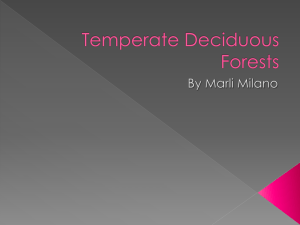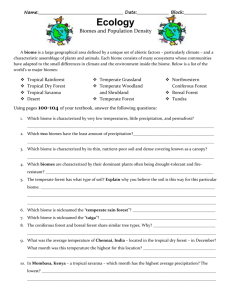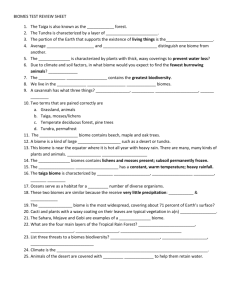Biomes Quiz Game
advertisement
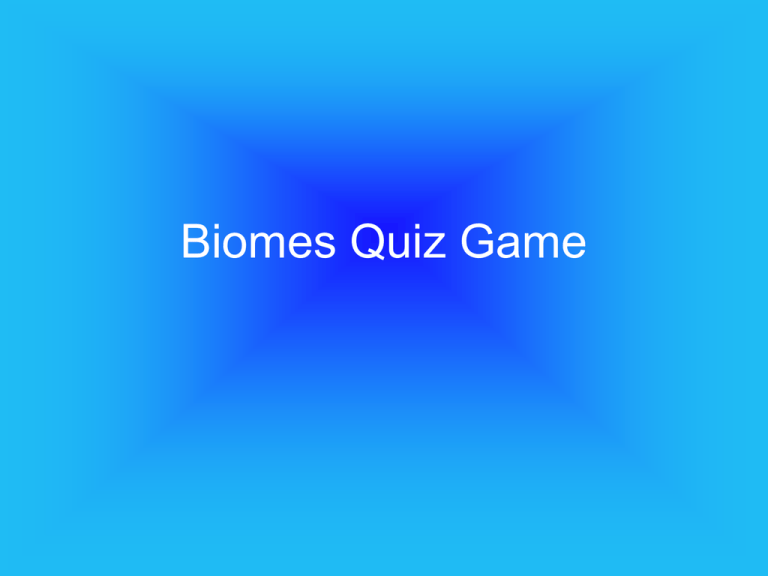
Biomes Quiz Game 1 point True or False? Another name of the tundra is the treeless region. 1 point Name a biome where a brightly colored monarch butterfly – which feeds on nectar from flowers – would most likely live. 2 points Give an example of a helpful-helpful ecological relationship found in the deciduous forest (where both organisms benefit). 2 point Why do animals hibernate? 1 point Each food chain must have a source of energy, a , a consumer, and a . 1 point True or False Animals burrow underground to adapt to different temperatures of the environment. 1 point True or False The grassland soil is very poor and not very nutritious. 1 point Where is the permafrost and why is it called the permafrost? 2 points What does “dormant” mean? 2 points True or False – Biomes make up, or build, ecosystems. All the different biomes put together make up the main ecosystems of the earth. 2 points Why do trees in the deciduous forest lose their leaves? What makes the leaves change color? 3 points Give an example of a rain forest food chain. 2 points Pretend you are walking through the coniferous boreal forest. The moose is a typical herbivore in that biome, but for some reason, there are no moose to be found. Give one of the reasons why the moose is no longer in the boreal forest. 3 points The grassland biome occasionally has to “deal with” fires that break out. During the dry summers, the prairie grasses catch on fire and burn to the ground. However, after the fire, the soil ends up more fertile than it was before the fire. Why? 2 point How does the high amount of rainfall in the rain forest affect the plants and soil in that biome? 3 points Give an example of a specialized structure of a plant for its seed dispersal. 2 points Between what special lines of latitude does the desert biome typically lie? 2 points What type of plants (think characteristics) survive in the coniferous forest/taiga? 2 points In what biome are the plants close to the ground and spread out in order to conserve water? 2 points Give an example of a defense mechanism for an animal found in the deciduous forest. 5 points Explain how the grizzly bear depends on the yellow daffodil in the taiga. 2 point List two reasons an organism may migrate. 3 points Name 2 different plant adaptations in the grassland/prairie biome. 3 points Name one taiga food chain. 3 points Name three different animal adaptations in the desert. 2 points Name two dominant carnivores in the deciduous forest. 2 points Does the daffodil on the bottom of the pyramid require more or less energy to live compared the rabbit? 2 points True or False – the climate and temperature affect what animals and plants make up a biome. 3 points Name three different ways plants disperse their seeds. 2 points Name two or more types of coniferous trees in the taiga. 3 points Explain how mimicry works. 2 points The further south and closer to the equator you go, the climate gets and the amount of precipitation . 2 points Give two specific examples of animal adaptations in the tundra. 3 points Give an example food chain for the desert. 2 points Give three different ways animals adapt to the rain forest biome. 2 points Give one example of an internal cue. Give one example of an external cue. 3 points What could be a human-caused problem in the taiga? 3 points Using benchmark lines of latitude in your answer, explain where the deciduous forest biomes are located on the earth. 1 points Define an herbivore. Give an example of one. 3 points Define an omnivore. Give an example of one. 2 points What is a scavenger? How does a scavenger relate to a decomposer? 5 points Why do animals migrate? In which direction do most animals migrate AND why that particular direction? 3 points Why do animals hibernate? What are some characteristics of hibernating animals? 2 points What does the arrow in a food chain or in a food web represent? 2 points What is the food chain below missing? 2 points True or False: the chipmunk is a consumer AND a producer in the food web. 2 points What animal does the rat give it’s energy to? 5 points Explain what happens to the owls in this ecosystem if a disease begins killing all the oak trees in the ecosystem.
